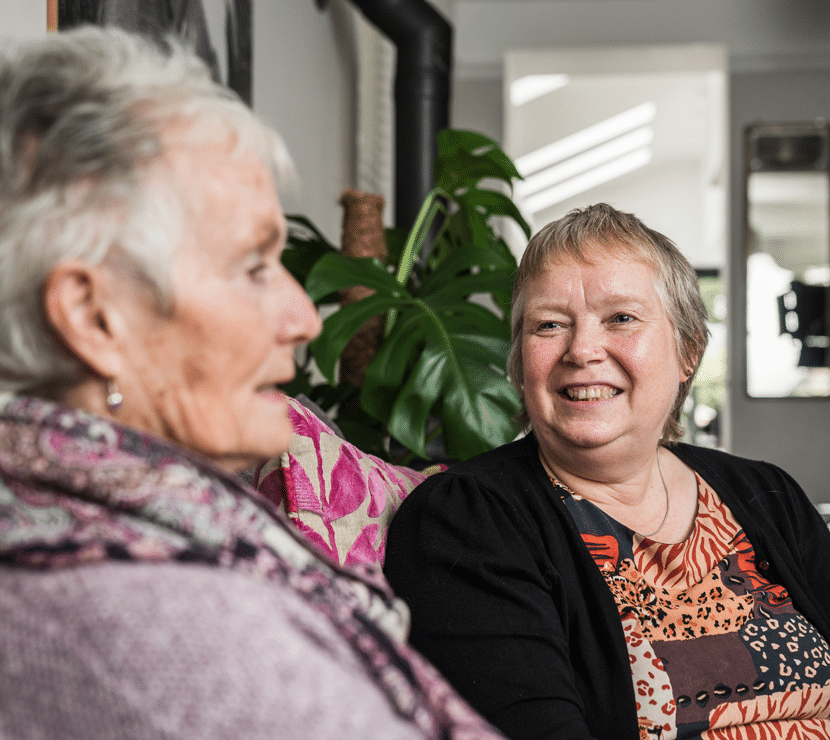Some people living with Alzimieher’s disease and other types of dementia experience difficulties in the late afternoon or early evening. This is known as ‘sundowning’ and it can lead to distressing symptoms such as agitation or confusion.
Sundowning may continue into the night making it difficult for people with dementia to fall asleep or stay in bed. The behaviours associated with sundowning can happen at any stage of dementia but are more common during the middle and later stages.
At Oxford Aunts, we understand how upsetting it can be when a loved one with dementia experiences sundowning. We support many families in Oxfordshire and its surrounding counties to manage this situation with our high-quality live-in care service for those who need dementia care.
Here we provide guidance on what causes sundowning along with some tips for managing symptoms when they occur.
What causes sundowning?
The reasons sundowning occurs are not well understood. One common theory is that dementia affects a person’s ‘biological clock’ which confuses their natural ability to distinguish between night and day.
Sundowning doesn’t affect everyone with dementia. It is estimated that 20% of people living with dementia experience sundowning symptoms.
It is likely that sundowning is caused by a range of different factors including:
- Unmet physical or emotional needs such as hunger, boredom, or pain
- Overstimulation during the day
- Not enough exposure to natural sunlight during the day
- Disturbed hormone levels
- Anxiety or depression
- Sensory impairments such as loss of hearing or sight
- Side effects of prescription medication
- Less need for sleep, which is common in older adults
What are the symptoms of sundowning?
Everyone experiences dementia differently, so sundowning symptoms will vary from person to person. Some of the most common behaviours associated with sundowning include:
- Pacing or wandering
- Confusion or agitation
- Rocking
- Insomnia
- Anxiety
- Depression
- Shadowing their caregivers or other family members
- Delusions or hallucinations
Advice for managing sundowning
Here are some useful tips for managing symptoms of sundowning when they occur:
- Stick to a predictable routine – It can be helpful to implement a daily, consistent routine that includes activities the person enjoys. Ensure they are getting enough exercise to encourage relaxation and promote well-being.
- Look past the behaviour – What may at first appear as sundowning might be the person trying to communicate an unmet need or want such as thirst or having to use the bathroom.
- Provide a peaceful environment – Try and reduce noise, clutter or people in the room to help the person relax and enjoy a good night’s rest.
- Try distracting the person – Sometimes all it takes to reduce sundowning behaviours is to distract the individual with their favourite snack, music or activity.
- Adjust the lighting – Many families find that natural lighting can be beneficial during the day whilst softer room lighting is preferable in the evening. There are also dementia light therapy boxes available that can help create a calming environment.
- Limit caffeine and alcoholic drinks – Instead, try offering decaffeinated coffee or tea, juice or soft drinks.
If sundowning behaviours persist, it may be beneficial to seek medical advice to rule out any underlying causes such as pain, a sleep disorder or other illness.
Expert dementia care at home for sundowning
With live-in care provided by Oxford Aunts, you can be assured of a high-quality, live-in care service provided by a trusted and established provider. For many years, we have supported families in Oxfordshire and its surrounding counties to manage the symptoms of dementia with our live-in care service.
Through our years of experience in supporting people living with dementia, we know that home is the best place for receiving dementia care. While moving at any stage of life can be challenging, this is especially true for people living with dementia. Remaining in the safety and familiarity of their much-loved homes for as long as possible provides great comfort to those living with dementia and their families.
With live-in care provided by Oxford Aunts, you can be assured of a high-quality, live-in care service provided by a trusted and established provider – a service that has provided peace of mind to many families, for many years.
Our high-quality dementia care includes:
- A comprehensive assessment of your physical, emotional and social needs
- Careful matching of an experienced and dedicated team of carers
- A highly-tailored care plan created using a multidisciplinary approach
- Unrivalled support from a team of two care management experts local to you
- Domestic support around your home including cleaning, vacuuming and laundry
- Cooking and preparing delicious and nutritious meals
- 24-hour emergency support, should you need it
How can live-in care benefit people with dementia?
For clients with dementia who do not wish to go into a residential care home, dementia care at home offers the personalised care needed from the comfort of familiar surroundings. Here are just some of the many benefits of our dedicated dementia care:
- Our carers can help people living with dementia maintain a predictable routine and their preferred lifestyle – something that is difficult to achieve in a care home setting.
- If your loved one’s condition changes over time, our care is flexible and can be adapted to meet their new care needs with minimal disruption.
- Our carers will be more than happy to encourage and support you in building or maintaining healthy habits including promoting exercise and cooking nutritious meals.
- Enjoy relief from the burden of domestic chores – our carers can assist with household tasks such as cooking, cleaning and laundry.
- Helping you render your home a safer environment by removing clutter and providing mobility assistance such as transferring between beds, wheelchairs, and other seating options.
- If you are no longer able to drive, a carer can assist with running errands.
- The physical symptoms associated with living with dementia may cause you to feel anxious or isolated at times. Our compassionate, live-in carers are there to provide you with companionship and friendship, if and when you need it.
Get in touch with us about your dementia care needs
Our expert care advisors are here to help you understand the options available to you. To learn more about our dementia care, complete our simple online form below or call us on.





